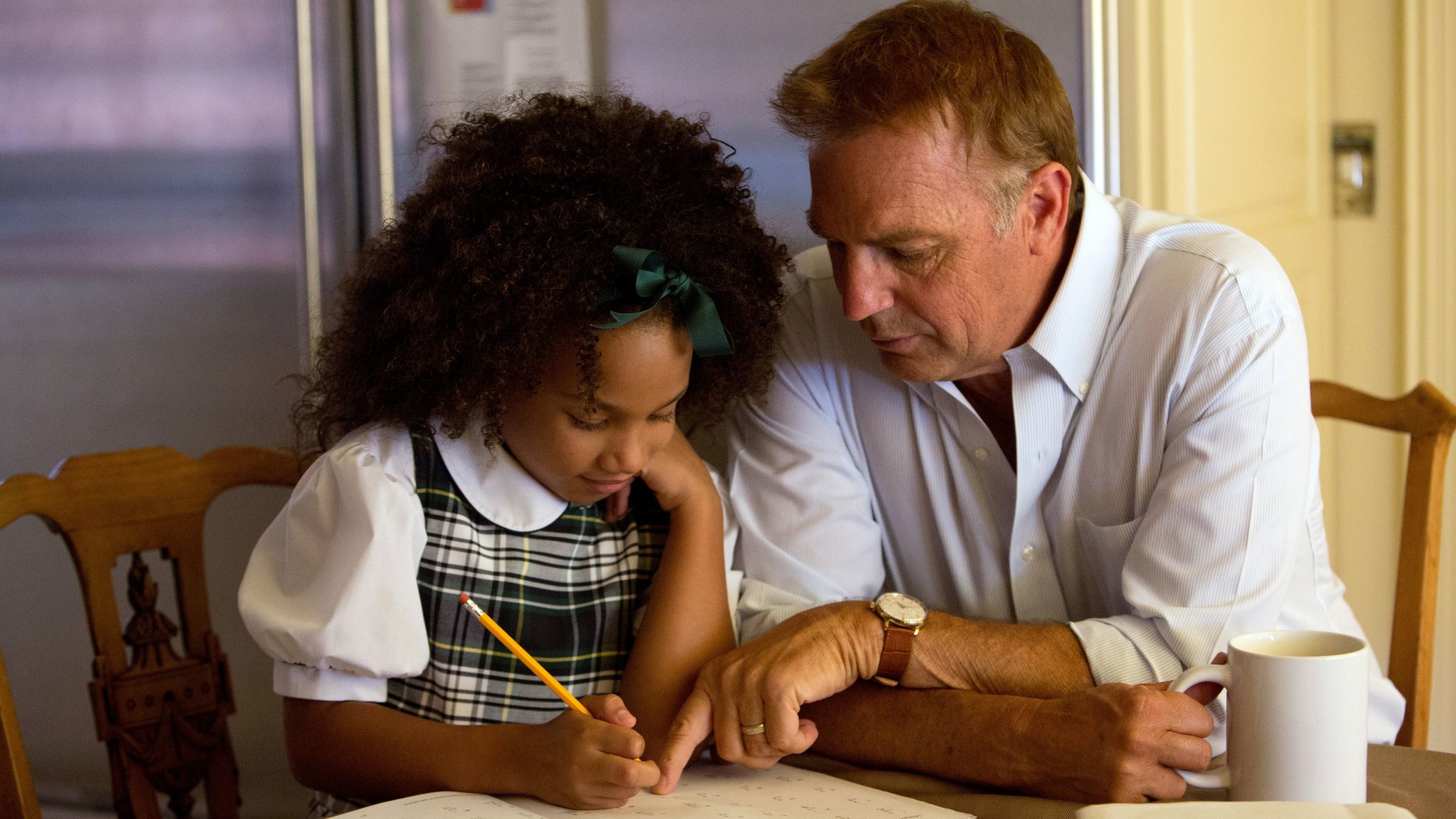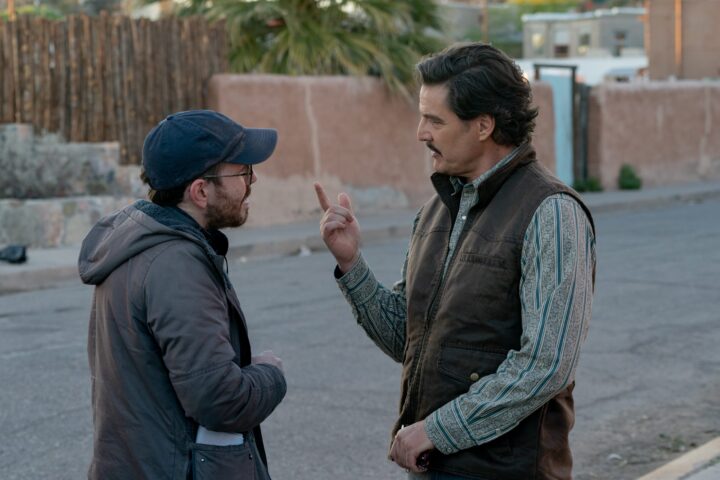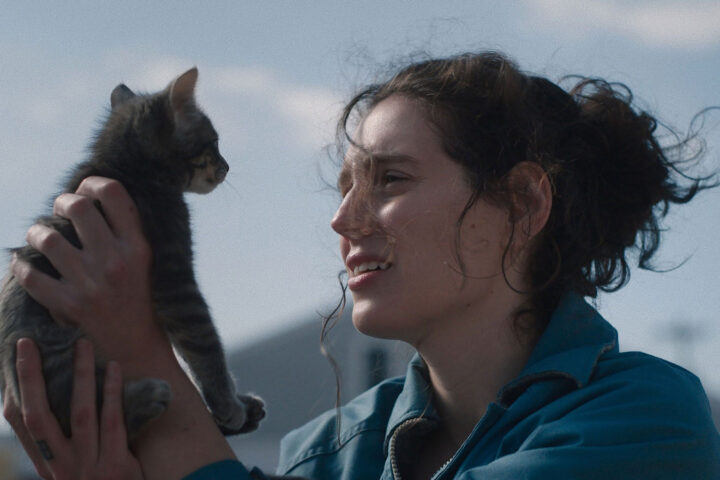Kevin Costner’s conflicted, weary performance as an LA attorney embroiled in a battle for custody of his bi-racial granddaughter is the best of several strong suits in Black or White, writer-director Mike Binder’s thoughtful examination of parenthood, race and identity. While not a perfect movie, it’s a smart one that raises questions about family and responsibility, and advocates facing down buried-deep demons.
When Elliot Anderson abruptly loses his beloved wife (Jennifer Ehle) in an accident, he’s left alone to care for their young granddaughter, whom the pair has raised as their own after their daughter’s untimely death during childbirth. Grief-stricken and ill equipped to manage Eloise’s (Jillian Estelle) daily routines of hair brushing and school drop-offs, he has two, more serious issues to deal with—one, his reliance on hard liquor at all hours. And the other, Eloise’s boisterous paternal grandmother, Rowena (Octavia Spencer, out of the park), a self-made entrepreneur with multiple business ventures running a tight-ship and clan of twenty in South Central, and by all accounts doing a damned good job of it.
The pair immediately clashes over what’s best for the girl, Rowena believing Eloise better served in the arms of her African-American family, able to be properly cared for while developing what she feels is the right cultural identity, away from a workaholic who left child-raising to his deceased wife (of whom she strongly approved) and who can’t stay away from the bottle. Of course, Elliot will have none of this, his own relationship with Eloise tender, sometimes difficult but filled with love.
When Rowena hires spirited attorney and brother Jeremiah (a terrific Anthony Mackie) to seek custody, Black or White sets up what we think will be a courtroom showdown polemic where we choose sides and obvious justice prevails, families come to terms and a child gets on the stand to show everyone the truth.
And that pleasantly turns out not to be the case. To begin with, both Elliot and Rowena are driven, intelligent, resourceful people, neither of whom Binder’s screenplay either advocates for or demonizes. And just as Elliot and Eloise demonstrate an unshakable father-daughter connection, so do Rowena and her extended family provide a loving safety net.
Things are complicated by the arrival of Eloise’s long-vanished, wayward addict father, Reggie (Andre Holland), who claims to be straight while Elliot knows otherwise, harboring reserves of resentment against him for his daughter’s unfortunate predicament and subsequent demise.
And it gets even more tangled when Jeremiah convinces a reluctant Rowena to engage Reggie in the court proceedings. Reggie doesn’t really want his daughter, but rather a payday from Elliot, which he receives in a blistering scene of dismissal, followed by another surprisingly spoken public confrontation punctuated by an unfortunate turn of phrase.
Black or White is an intelligent and perceptive a film, and one with no easy solutions, a marvelous character study of a man who simply cannot get a grip on his drink and grief, mired in past resentments yet still able to see the inconvenient truth, as he tells drugged-up Reggie, “You come from a good family.”
Costner’s prickly, drunk and affecting character knows his limitations but also knows his deep love for his granddaughter, the one piece of family he has left. And while Spencer’s Rowena publicly defends her son’s behaviors, she’s too astute to overlook the truth, which comes out in a powerful mother to son dressing down.
Binder’s screenplay is so strong in its drawing of these two characters (as well as the supporting ones) that it nearly erases any “issue” from the movie. This is simply a case of two likable and capable people, both with blind spots, trying their best to do what they believe is right. There are no villains.
After working together in Binder’s 2005 drama The Upside of Anger, where Binder wrote Costner another offbeat and abrasive character alongside Joan Allen, Costner passed on four of Binder’s subsequent screenplays before accepting Black or White and producing the film as well, and in Elliot Anderson Binder has given his star a plum role, perhaps one of his most complex, and one that allows Costner to be paunchy, middle-aged and troubled, a person merely doing his best in a difficult situation, sans heroics.
And Spencer, the dynamic Oscar-winner who takes control of a scene like nobody’s business and can mine humor and pathos on a dime, gives us an admirable force of nature whose quest is motivated by her boundless capacity for love, rather than selfish need to win. It’s quite something to see.
After writing this pair of memorably flawed people, Binder refuses to stack the deck in star Costner’s favor, setting up an absorbing mano-a-womano that makes plausible cases for both sides here while pulling no punches from Elliot’s alcoholism and Reggie’s relapse into drug addiction. People are flawed, but they’re doing their best.
And if Black or White sometimes feels somewhat squarely dated when it gets into the courtroom, it culminates in galvanizing testimonial summation about deeply embedded racial beliefs, and how to get past it, Costner delivering the lines and the entire movie in that moment. It’s almost as if Black or White exists for that moment of truth, the mechanics of the screenplay forcing his character both into a corner and into admission of an uncomfortable truth.
Special notice should be given to the wonderful Paul Newsome as the no-nonsense judge with a low tolerance for Rowena’s unorthodox courtroom demeanor. In a handful of brief scenes, Newsome’s droll, jaded expressions give a much-needed comic lift to the proceedings.
3 1/2 stars.



